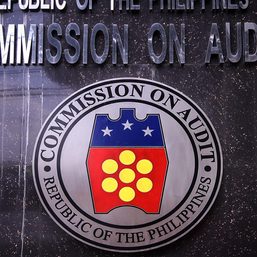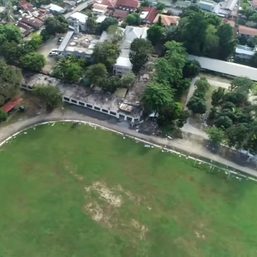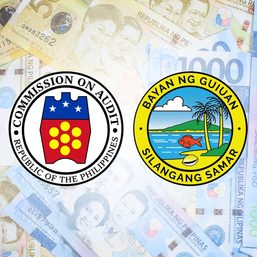SUMMARY
This is AI generated summarization, which may have errors. For context, always refer to the full article.
State auditors flagged Davao City’s P672.5 million worth of spending for its COVID-19 response, spotting multiple violations of audit and documentary rules, including a P7.9-million employment project that found questionable beneficiaries.
These were included in the 2020 audit report of the city, released just recently by the Commission on Audit (COA).
COA found three major violations in the COVID-19 spendings:
- Procurements not supported by required documents
- Direct negotiations with suppliers done without authorization
- Distributions of aid not properly documented
Of the transactions flagged, there was a P309 million worth of disbursement vouchers (DVs) to local food and construction suppliers that COA found to have been directly negotiated without authority.
Negotiated procurements were generally sanctioned in the pandemic to hasten processes in a crisis and do away with the bureaucracy of public bidding.
“Examination of the subject DVs revealed that the City Mayor’s Office directly negotiated with the suppliers for procurement of these items, which were successfully procured even without any issuance, document, or communication pertaining to the delegation of authority from the Head of Procuring Entity (HoPe),” said COA.
The head of the procuring entity of the city is presidential daughter Mayor Sara Duterte. The city told COA that Duterte had given her “verbal authorization” to her chief-of-staff.
“We request that the recommendations be immediately implemented and we will appreciate being informed of the actions taken thereon,” COA said to Duterte in its transmittal letter received by the local government on April 26.
Here is the breakdown of the flagged transactions/projects that make up the P672.5 million:
P17 million for funeral and groceries
Davao City sourced from grants and donations a total of P17.065 million to fund funeral assistance and other food assistance to those affected by COVID-19.
COA said the city’s Local Disaster Risk Reduction and Management Fund Investment Plan (LDRRMFIP) did not specify where the cash donations would go to, and did not have memoranda of agreement (MOA) with the donors.
“As a necessary consequence, the lack of the Supplemental LDRRMFIP as mentioned above would render the utilization of the cash donations unauthorized, indicating that the management did not fully observe the cited provisions regarding the usage of the said fund,” said COA.
P33.4 million for hazard pay
COA said the payments of these hazard pay to city employees lacked the necessary document authorizing such workers to physically report.
“Thus, the payments for COVID-19 hazard pay could not be ascertained as valid in the absence of the prior authority to report for work issued by the head of agency or her designated official,” said COA.
The local government said it was due to “the instant exigency of service,” and “assured that in cases where a similar event might happen, they will prepare the necessary prior authority to report for work.”
P199 million for rice and other food subsidies
The payments for such subsidies were lacking material documents such as obligation request, acceptance and inspection report, purchase request, and purchase order, said COA.
“These lapses hinder the audit team to conduct a timely review on the legality of the procurement contract as well as the inspection as to the existence of the supplies, thus deficiencies, if any, cannot be detected or rectified on time,” said COA.
The local government said the office overlooked some of the documents because there was a “heavy influx” of paperwork that came their way when the operations of the city hall was disrupted.
P24 million for construction and PPE
The city spent P24 million for construction, face masks, and other personal protective equipment (PPE), but it did so without fully complying to the documentary and required requirements under the Bayanihan law, including lacking a warranty clause.
Lack of warranty clause would prevent the city from running after suppliers who do not fulfill all of their obligations.
The city said they created an account on the Government Procurement Policy Board (GPPB) website to post the requirements there, but the GPBB has not confirmed their account as of February 15, 2021.
P58 million for food subsidy
The city spent P58 million for food packs, each containing rice procured from a private supplier rather than the National Food Authority (NFA). The audit report did not specify how much the rice cost, out of the total P58 million.
COA said the city directly negotiated with Davao ERJV Enterprises instead of sourcing the rice from the NFA as required by existing regulations. There was also no required NFA waiver, said auditors.
“Normally, NFA rice is priced lower than commercial rice, making it more affordable especially to low-income-earning government agencies. Had the procurement of rice been sourced from the NFA, they could have saved money to be utilized for other benefits or increased the number of packs to be distributed to the intended beneficiaries,” said COA.
Davao City said it wanted to provide better quality rice to its constituents and that it will submit the waiver once they receive it.
P325 million for grocery, food, and construction
COA said Davao City spent P325 million for grocery, food, and construction repairs but these transactions were “deficient of the required documents, and inconsistent with the laws, rules and regulations, thus affecting the legality and propriety of procedures in the procurement.”
COA also found that there were neither delivery receipts from suppliers, nor distribution lists, “hence, the completeness of delivery of the subject items could not be verified/validated.”
The city said they resorted to acknowledgment receipts signed by facility personnel to avoid contact with COVID-19 patients.
P7.95 million for jobs program
The city spent P7.95 million for its TUPAD program, which gives temporary jobs to workers displaced by the pandemic.
However, COA observed that:
- Selection of beneficiaries not strictly based on guidelines
- It offered employment to two members of one household, when it should only be one
- The second beneficiaries in the household cannot be reached
- Daily time records of some were questionable, such as those with student beneficiaries who logged time that was contrary with their school schedule
- Incomplete certification for the beneficiaries
- Beneficiaries said they did not receive PPE as promised
- Some were paid twice
Commenting on why they assisted more than one member of a household, the local government said it believed “extending the project to the relative/s of the worker will lessen the impact of displacement.”
Those paid twice have been notified to refund the excess, said Davao City.
P8.5 million for cremation and funeral services
COA said the P8.5 million funding for cremation and funeral assistance “breached” rules set by the Department of the Interior and Local Government and Department of Health, such as the lack of MOA with the funeral homes.
Because there were no MOA, some of their contractors charged different amounts per person, such as the Cosmopolitan Funeral Homes which charged a range from P35,000 to P60,000 for services.
There were also problems with the screening and documentation of the beneficiaries, said COA.
“The failure of the responsible offices to observe the prescribed guidelines and procedures affected the propriety of the transactions. Also, this may expose the funds to misuse and may open to abuse the authority in its disposition,” said COA.
Davao City asked for “indulgence” for the lapse, saying that the 12-hour cremation window of a COVID-19 death contributed to the “haphazard” way by which they screened their beneficiaries. – Rappler.com
Add a comment
How does this make you feel?






![[Time Trowel] Evolution and the sneakiness of COVID](https://www.rappler.com/tachyon/2024/02/tl-evolution-covid.jpg?resize=257%2C257&crop=455px%2C0px%2C1080px%2C1080px)


![[The Slingshot] Alden Delvo’s birthday](https://www.rappler.com/tachyon/2024/04/tl-alden-delvo-birthday.jpg?resize=257%2C257&crop=263px%2C0px%2C720px%2C720px)




There are no comments yet. Add your comment to start the conversation.